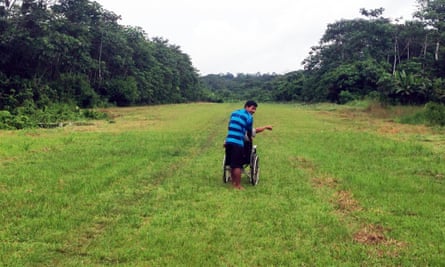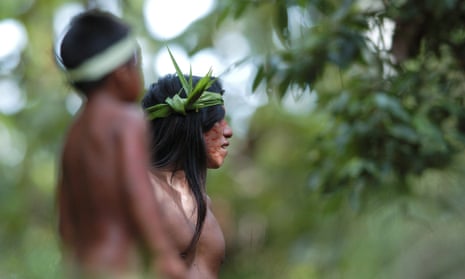At an internet cafe in Coca, a city near the Ecuadorian Amazon, Felipe Googles Huaorani, the name of his tribe, and scrolls through the images. “It makes me a little sad,” he says. “People come and take photos and sell them in cities and don’t give anything to us”.
He pointed to a photo of a Huaorani boy talking to a white-haired white man with a camera. “That’s my son,” he said. But when I asked who the white man is, he said he didn’t know.
“Who took the picture?” I asked.
“I don’t know,” he said. “That’s the problem.”
Two days later, in the Huaorani village of Quehueri-Ono, I watched a group of American tourists photograph an elderly man named Dabo who, having lost the use of his legs to polio, lay on a mattress in the middle of his longhouse.
His home, built from palm leaves and tree trunks, had a traditional fire in one corner tended by his wife, Weba. Children, teenagers and adults drift in and out. The English-speaking guide points out Weba’s balsa wood ear expansions to the tourists and then says, “Notice how deformed her feet are,” indicating her elongated, separated toes, which allow her to climb trees and trek through the forest.
The tourists snap photos. They photograph Dabo on his mattress. They photograph the children and show the photos to the children, who delight in swiping their fingers across the smartphone screens. One tourist coos, “Smile!” at a three-year-old, then coos the exact same “Smile!” to Dabo. She holds his arm in hers, and he weakly raises his head and nods. “Bless you,” she says.
Weba tells the tourists that she had hurt herself falling that day and holds up her injured foot to show them. She speaks through two translators: the Huaorani guide, Bai, translates Weba’s words from Huao Terero, the Huao language, into Spanish; the other, an Ecuadorian naturalist guide, translates Bai’s words from Spanish into English. The naturalist guide says that the tourists are lucky, sometimes Weba doesn’t want to talk. He gives her a machete and a bag of food. “She says thank you, now we will eat well tonight,” he tells the tourists. At the end of the visit, Weba gives each tourist a Huaorani name. The naturalist guide tells them, “She says now you are part of the Huaorani family, like brothers.” The tourists, thrilled, pose for photos with Weba.
“I feel blessed,” says a middle-aged woman, “she just makes you smile.”

After the tourists leave, I ask Weba, through Felipe, what she thought of them. Felipe tells me, “She says they come, but they don’t help.” And by help they mean give money.
The complaint that the tourists don’t give money is something I had been hearing a lot. I had heard it the night before at Felipe’s house, as we lay in hammocks around a dying fire. Tourists had come to Felipe’s village a few days earlier, and Felipe and his family had painted their faces with achiote and shown them a traditional song and dance. “Those tourists left very happy,” Felipe told me, but they didn’t leave much money – maybe a tip of $5-10. He thinks they should pay $20 per person.
I heard the complaint again in Quehueri-Ono, where villagers sat behind school desks covered with handmade crafts for sale. Nenekoa, another polio survivor, who uses a wheelchair with broken brakes, told me that it takes him six days to make a miniature blowgun and arrows, which he sells for $20 each. The tourists come, he said, but they only buy one small thing each. The day I visited, there were at least 20 Huaorani hoping to sell handicrafts. There were eight tourists. As Nenekoa described the polio outbreak during an evangelical mission that had cost him the use of his legs, the women selling crafts began to dance with the tourists. They put their hands on each other’s shoulders and moved forward and back as they sang. Both the Huaorani and the tourists were smiling. Nenekoa told me, through Felipe, “They dance so that the tourists will pay, but they don’t pay.”
When I asked Felipe where the tourists come from, he was vague, but by the time we got to Dabo and Weba’s house, it became clear that they were guests of Huaorani Ecolodge, which is run by Tropic Journeys in Nature, an award-winning ecotourism company based in Quito. Eweme, a middle-aged Huaorani man who has worked for Huaorani Ecolodge as a guide, told me he gets paid $20 per day, but the Huaorani who sing, dance, open their homes and sell crafts are not paid.
Several Huaorani said they believe the guides tell the tourists not to give money, or to pay less for handicrafts. In Huaorani Ecolodge’s “explorer’s guide,” which is sent to the tourists before their arrival, tourists are encouraged to tip the “naturalist guides” $15 per day and the “staff” $10 per day. The naturalist guide is an Ecuadorian guide who speaks English and studied tourism at university. The Huaorani guide, who several tourists said seemed to know more about the forest than the naturalist, is not mentioned in the explorer’s guide, though is perhaps included in “staff”. Tourists are told that they should put a total tip for all the staff members into an envelope, which the Lodge manager distributes to the community. Naturalist guides, on the other hand, are tipped directly.
If the tourists want to further support the community, they are encouraged to give school supplies or donate to Tropic’s Waponi initiative, which their website describes as a “business incubator aimed at providing small community-based tourism initiatives in Ecuador and Peru with the market access and skills to compete and thrive”.
One visitor who travelled with Huoarani Ecolodge in 2013 did not think that the Huaorani wanted tips for cultural demonstrations. “It wasn’t like a bellhop in a hotel or anything,” he said, though they did want people to buy crafts. He tipped the suggested $10 per day directly to each Huaorani who worked at the Lodge during his stay (a total of about $50 per person, or $200), and had gotten the sense that the Huaorani were surprised and pleased that he did so.
Towards the end of my conversation with Eweme, I asked the question that had been bothering me all day: since the business cannot operate without the Huaorani’s knowledge of the rainforest, without their dances and basket-weaving and blowgun demonstrations, why not just tell Huaorani Ecolodge that they won’t participate until conditions are changed and the money is distributed more evenly? Eweme is vague in his answer, and I can’t see him or his fellow guides organising against the company.
The thing is, the Huaorani are already involved in decisions regarding the management of the Lodge. When I visited him at his office, Jascivan Carvalho, the general manager of Tropic, told me how in 1994, the Huaorani of Quehueri-Ono had asked the company for help “so that tourism could be used as a tool for conservation and a strategy for recuperating and strengthening their culture”.
Tropic has given the people of Quehueri-Ono and the surrounding communities an alternative to oil development, which has truly devastated both the rainforest and Huaorani culture. It also helps educate tourists about the damage that oil operations have done.
“The communities are part of the business plan and are owners of the business. They are not resources for the business,” Carvalho said. He added that the Huaorani who work for the Lodge are involved in decisions about daily operations. In addition, each year they assemble the five participating communities to discuss how the business is going, make a plan for the year and decide what to do with the yearly profits. “One of the beautiful things that has happened in this process is that the Huaorani have opted to keep the profits in the business,” Carvalho said. These assemblies also set the pay rate for the Lodge’s staff.
After paying $700-$900 in fees, plus transportation costs and tips, travellers may wonder how there is still so much need in Quehueri-Ono and the surrounding communities: why there is no electricity in Apaika, for instance, or why the brakes on Nenekoa’s wheelchair do not work. Carvalho would not answer questions about the Lodge’s yearly profits, but he said that Huoarani Ecolodge sees 350 visitors per year, a number that is growing. The five communities that participate have a total population of about 350 people. That means that for each Huaorani in the area, the business brings in $700-900 per year minus costs which, based on the cost of my own trip to the area, likely reduce that amount to $300-$600.
Not that the money is distributed to individuals. Carvalho points out that their decision to reinvest profits into the business is one that they make in hopes of attracting more tourists and therefore more work – which is how elders like Dabo and Weba end up earning no or little cash from spending a few hours with American tourists. Yet, the need in the communities is so great that it is easy to see how tipping for cultural demonstrations and home visits could lead to further problems.
One of the great ironies that the Huaorani live with is that while Felipe and Eweme’s grandfathers defended the forest by spearing invaders, their grandchildren see bringing more foreigners in as a necessity to their survival. They live in a forest that has been fractured by oil roads and polluted by oil operations. Their elders’ bodies still bear the damage done by the evangelicals. The Huaorani have never been fairly compensated for the pollution caused by oil companies, or the relentless push of missionaries. If they had been, ecotourism would not be necessary.
Both Eweme and Felipe want their children to learn English. They want to find a way to cut out the middlemen, the naturalist guides, who they are keenly aware earn more in tips than the Huaorani. Felipe wants to start an exchange program to have Huaorani youth study English in the US and American youth come to his village to learn about the rainforest. He sees the inability of the Huaorani to read and write documents as part of why they have lost so much. “We can’t defend with spears anymore,” he told me, “now we need to defend with pens and notebooks.” Felipe’s ultimate goal is to start his own tourist business and use it to fund an education program to prevent Huaorani youth from losing their culture and knowledge of the rainforest – a real danger now that Huaorani have been forcibly exposed to what they refer to as “the Occidental world”.
Angela Drake, whose husband works at the US embassy in Ecuador, travelled with Huaorani Ecolodge last summer. She told me she was concerned after she visited Dabo and Weba’s house about the living conditions of the elders. “I began to question whether we were helping or hurting the Huaorani, but in the end it’s probably preferable to having oil companies develop their land for oil.” Despite her reservations, Drake worried about potentially discouraging other families from traveling with Huaorani Ecolodge. “It was the trip of a lifetime,” Drake said and added that meeting Dabo and Weba “was probably a more honest cultural exchange” than any other her family has experienced.
Since meeting Felipe during her trip, Drake is now working with him on applying for a grant to bring solar panels to his village, Apaika. A few weeks ago, Felipe travelled to Quito for two days to meet with university students who he hopes to collaborate with on bringing students to Apaika. He wanted to stay in Quito longer, but he didn’t have the cash.

Comments (…)
Sign in or create your Guardian account to join the discussion